Psychology 101 Essay: Nature vs. Nurture in Intelligence Development
VerifiedAdded on 2022/10/02
|8
|2263
|349
Essay
AI Summary
This essay delves into the complex interplay between genetics and environmental factors in shaping human intelligence. It highlights the significant role of both heredity and ecological dynamics, emphasizing that intelligence is not solely determined by genes but is influenced by a combination of intricate gene interactions and environmental conditions. The essay references the use of IQ as a measure and cites twin studies to illustrate the relative contributions of genetics and environment. Furthermore, it discusses the impact of factors such as maternal stress, family dynamics, parenting styles, and ordinal position within a family on intellectual development. The conclusion underscores the ongoing debate and the need for further research to fully understand the multifaceted nature of intelligence and the relative influences of biological and environmental factors. This is a great resource for psychology students on Desklib.
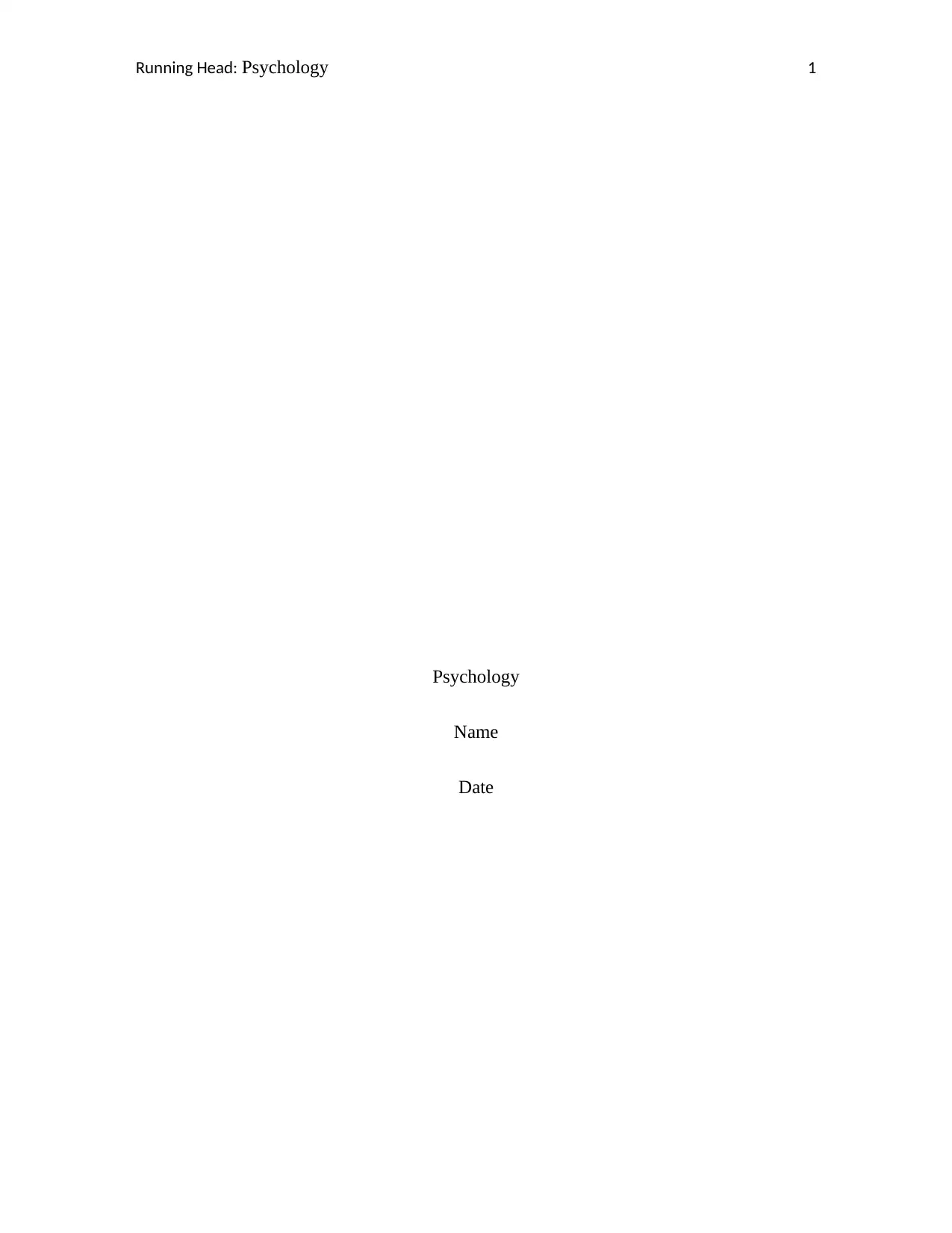
Running Head: Psychology 1
Psychology
Name
Date
Psychology
Name
Date
Paraphrase This Document
Need a fresh take? Get an instant paraphrase of this document with our AI Paraphraser
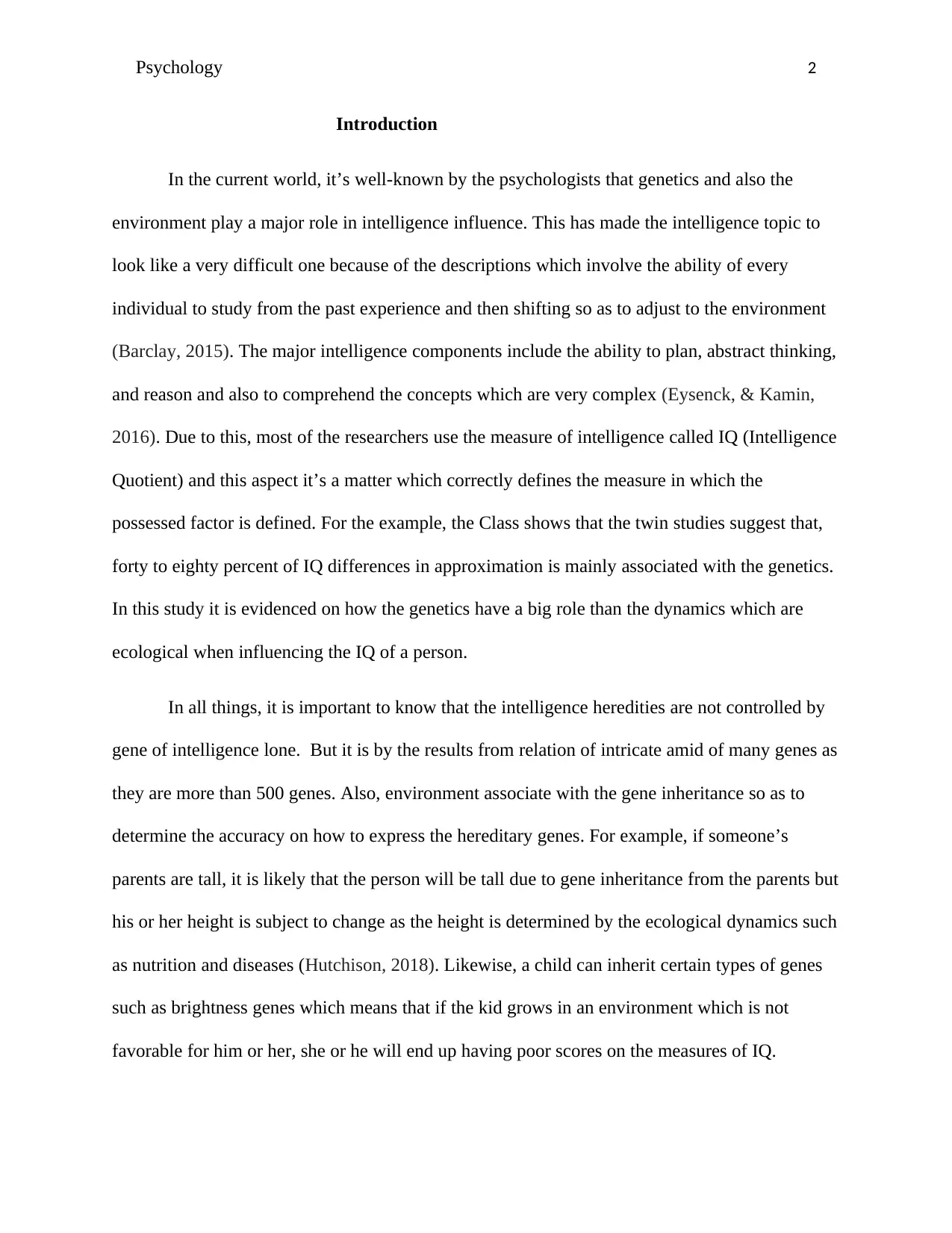
Psychology 2
Introduction
In the current world, it’s well-known by the psychologists that genetics and also the
environment play a major role in intelligence influence. This has made the intelligence topic to
look like a very difficult one because of the descriptions which involve the ability of every
individual to study from the past experience and then shifting so as to adjust to the environment
(Barclay, 2015). The major intelligence components include the ability to plan, abstract thinking,
and reason and also to comprehend the concepts which are very complex (Eysenck, & Kamin,
2016). Due to this, most of the researchers use the measure of intelligence called IQ (Intelligence
Quotient) and this aspect it’s a matter which correctly defines the measure in which the
possessed factor is defined. For the example, the Class shows that the twin studies suggest that,
forty to eighty percent of IQ differences in approximation is mainly associated with the genetics.
In this study it is evidenced on how the genetics have a big role than the dynamics which are
ecological when influencing the IQ of a person.
In all things, it is important to know that the intelligence heredities are not controlled by
gene of intelligence lone. But it is by the results from relation of intricate amid of many genes as
they are more than 500 genes. Also, environment associate with the gene inheritance so as to
determine the accuracy on how to express the hereditary genes. For example, if someone’s
parents are tall, it is likely that the person will be tall due to gene inheritance from the parents but
his or her height is subject to change as the height is determined by the ecological dynamics such
as nutrition and diseases (Hutchison, 2018). Likewise, a child can inherit certain types of genes
such as brightness genes which means that if the kid grows in an environment which is not
favorable for him or her, she or he will end up having poor scores on the measures of IQ.
Introduction
In the current world, it’s well-known by the psychologists that genetics and also the
environment play a major role in intelligence influence. This has made the intelligence topic to
look like a very difficult one because of the descriptions which involve the ability of every
individual to study from the past experience and then shifting so as to adjust to the environment
(Barclay, 2015). The major intelligence components include the ability to plan, abstract thinking,
and reason and also to comprehend the concepts which are very complex (Eysenck, & Kamin,
2016). Due to this, most of the researchers use the measure of intelligence called IQ (Intelligence
Quotient) and this aspect it’s a matter which correctly defines the measure in which the
possessed factor is defined. For the example, the Class shows that the twin studies suggest that,
forty to eighty percent of IQ differences in approximation is mainly associated with the genetics.
In this study it is evidenced on how the genetics have a big role than the dynamics which are
ecological when influencing the IQ of a person.
In all things, it is important to know that the intelligence heredities are not controlled by
gene of intelligence lone. But it is by the results from relation of intricate amid of many genes as
they are more than 500 genes. Also, environment associate with the gene inheritance so as to
determine the accuracy on how to express the hereditary genes. For example, if someone’s
parents are tall, it is likely that the person will be tall due to gene inheritance from the parents but
his or her height is subject to change as the height is determined by the ecological dynamics such
as nutrition and diseases (Hutchison, 2018). Likewise, a child can inherit certain types of genes
such as brightness genes which means that if the kid grows in an environment which is not
favorable for him or her, she or he will end up having poor scores on the measures of IQ.
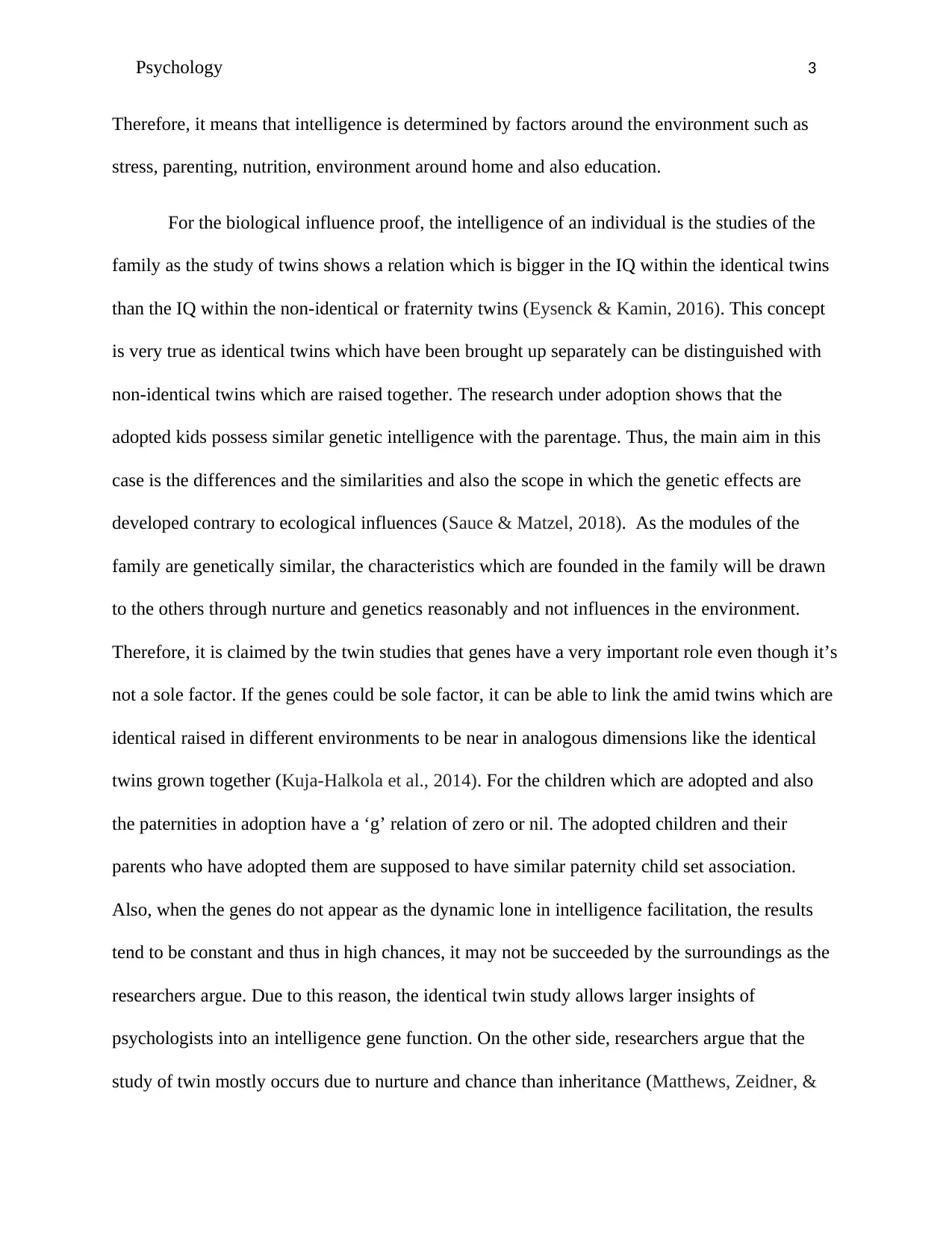
Psychology 3
Therefore, it means that intelligence is determined by factors around the environment such as
stress, parenting, nutrition, environment around home and also education.
For the biological influence proof, the intelligence of an individual is the studies of the
family as the study of twins shows a relation which is bigger in the IQ within the identical twins
than the IQ within the non-identical or fraternity twins (Eysenck & Kamin, 2016). This concept
is very true as identical twins which have been brought up separately can be distinguished with
non-identical twins which are raised together. The research under adoption shows that the
adopted kids possess similar genetic intelligence with the parentage. Thus, the main aim in this
case is the differences and the similarities and also the scope in which the genetic effects are
developed contrary to ecological influences (Sauce & Matzel, 2018). As the modules of the
family are genetically similar, the characteristics which are founded in the family will be drawn
to the others through nurture and genetics reasonably and not influences in the environment.
Therefore, it is claimed by the twin studies that genes have a very important role even though it’s
not a sole factor. If the genes could be sole factor, it can be able to link the amid twins which are
identical raised in different environments to be near in analogous dimensions like the identical
twins grown together (Kuja-Halkola et al., 2014). For the children which are adopted and also
the paternities in adoption have a ‘g’ relation of zero or nil. The adopted children and their
parents who have adopted them are supposed to have similar paternity child set association.
Also, when the genes do not appear as the dynamic lone in intelligence facilitation, the results
tend to be constant and thus in high chances, it may not be succeeded by the surroundings as the
researchers argue. Due to this reason, the identical twin study allows larger insights of
psychologists into an intelligence gene function. On the other side, researchers argue that the
study of twin mostly occurs due to nurture and chance than inheritance (Matthews, Zeidner, &
Therefore, it means that intelligence is determined by factors around the environment such as
stress, parenting, nutrition, environment around home and also education.
For the biological influence proof, the intelligence of an individual is the studies of the
family as the study of twins shows a relation which is bigger in the IQ within the identical twins
than the IQ within the non-identical or fraternity twins (Eysenck & Kamin, 2016). This concept
is very true as identical twins which have been brought up separately can be distinguished with
non-identical twins which are raised together. The research under adoption shows that the
adopted kids possess similar genetic intelligence with the parentage. Thus, the main aim in this
case is the differences and the similarities and also the scope in which the genetic effects are
developed contrary to ecological influences (Sauce & Matzel, 2018). As the modules of the
family are genetically similar, the characteristics which are founded in the family will be drawn
to the others through nurture and genetics reasonably and not influences in the environment.
Therefore, it is claimed by the twin studies that genes have a very important role even though it’s
not a sole factor. If the genes could be sole factor, it can be able to link the amid twins which are
identical raised in different environments to be near in analogous dimensions like the identical
twins grown together (Kuja-Halkola et al., 2014). For the children which are adopted and also
the paternities in adoption have a ‘g’ relation of zero or nil. The adopted children and their
parents who have adopted them are supposed to have similar paternity child set association.
Also, when the genes do not appear as the dynamic lone in intelligence facilitation, the results
tend to be constant and thus in high chances, it may not be succeeded by the surroundings as the
researchers argue. Due to this reason, the identical twin study allows larger insights of
psychologists into an intelligence gene function. On the other side, researchers argue that the
study of twin mostly occurs due to nurture and chance than inheritance (Matthews, Zeidner, &
⊘ This is a preview!⊘
Do you want full access?
Subscribe today to unlock all pages.

Trusted by 1+ million students worldwide
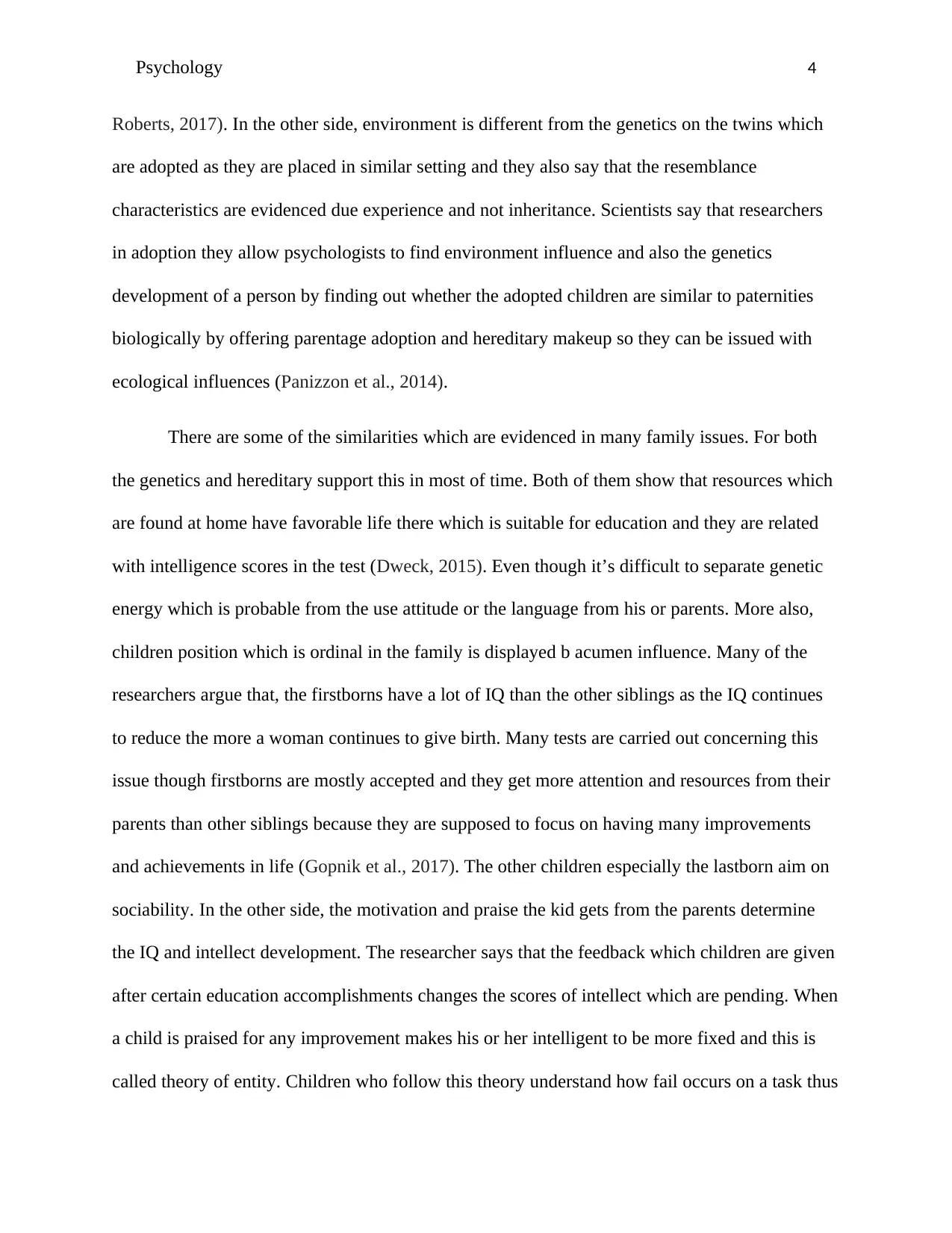
Psychology 4
Roberts, 2017). In the other side, environment is different from the genetics on the twins which
are adopted as they are placed in similar setting and they also say that the resemblance
characteristics are evidenced due experience and not inheritance. Scientists say that researchers
in adoption they allow psychologists to find environment influence and also the genetics
development of a person by finding out whether the adopted children are similar to paternities
biologically by offering parentage adoption and hereditary makeup so they can be issued with
ecological influences (Panizzon et al., 2014).
There are some of the similarities which are evidenced in many family issues. For both
the genetics and hereditary support this in most of time. Both of them show that resources which
are found at home have favorable life there which is suitable for education and they are related
with intelligence scores in the test (Dweck, 2015). Even though it’s difficult to separate genetic
energy which is probable from the use attitude or the language from his or parents. More also,
children position which is ordinal in the family is displayed b acumen influence. Many of the
researchers argue that, the firstborns have a lot of IQ than the other siblings as the IQ continues
to reduce the more a woman continues to give birth. Many tests are carried out concerning this
issue though firstborns are mostly accepted and they get more attention and resources from their
parents than other siblings because they are supposed to focus on having many improvements
and achievements in life (Gopnik et al., 2017). The other children especially the lastborn aim on
sociability. In the other side, the motivation and praise the kid gets from the parents determine
the IQ and intellect development. The researcher says that the feedback which children are given
after certain education accomplishments changes the scores of intellect which are pending. When
a child is praised for any improvement makes his or her intelligent to be more fixed and this is
called theory of entity. Children who follow this theory understand how fail occurs on a task thus
Roberts, 2017). In the other side, environment is different from the genetics on the twins which
are adopted as they are placed in similar setting and they also say that the resemblance
characteristics are evidenced due experience and not inheritance. Scientists say that researchers
in adoption they allow psychologists to find environment influence and also the genetics
development of a person by finding out whether the adopted children are similar to paternities
biologically by offering parentage adoption and hereditary makeup so they can be issued with
ecological influences (Panizzon et al., 2014).
There are some of the similarities which are evidenced in many family issues. For both
the genetics and hereditary support this in most of time. Both of them show that resources which
are found at home have favorable life there which is suitable for education and they are related
with intelligence scores in the test (Dweck, 2015). Even though it’s difficult to separate genetic
energy which is probable from the use attitude or the language from his or parents. More also,
children position which is ordinal in the family is displayed b acumen influence. Many of the
researchers argue that, the firstborns have a lot of IQ than the other siblings as the IQ continues
to reduce the more a woman continues to give birth. Many tests are carried out concerning this
issue though firstborns are mostly accepted and they get more attention and resources from their
parents than other siblings because they are supposed to focus on having many improvements
and achievements in life (Gopnik et al., 2017). The other children especially the lastborn aim on
sociability. In the other side, the motivation and praise the kid gets from the parents determine
the IQ and intellect development. The researcher says that the feedback which children are given
after certain education accomplishments changes the scores of intellect which are pending. When
a child is praised for any improvement makes his or her intelligent to be more fixed and this is
called theory of entity. Children who follow this theory understand how fail occurs on a task thus
Paraphrase This Document
Need a fresh take? Get an instant paraphrase of this document with our AI Paraphraser
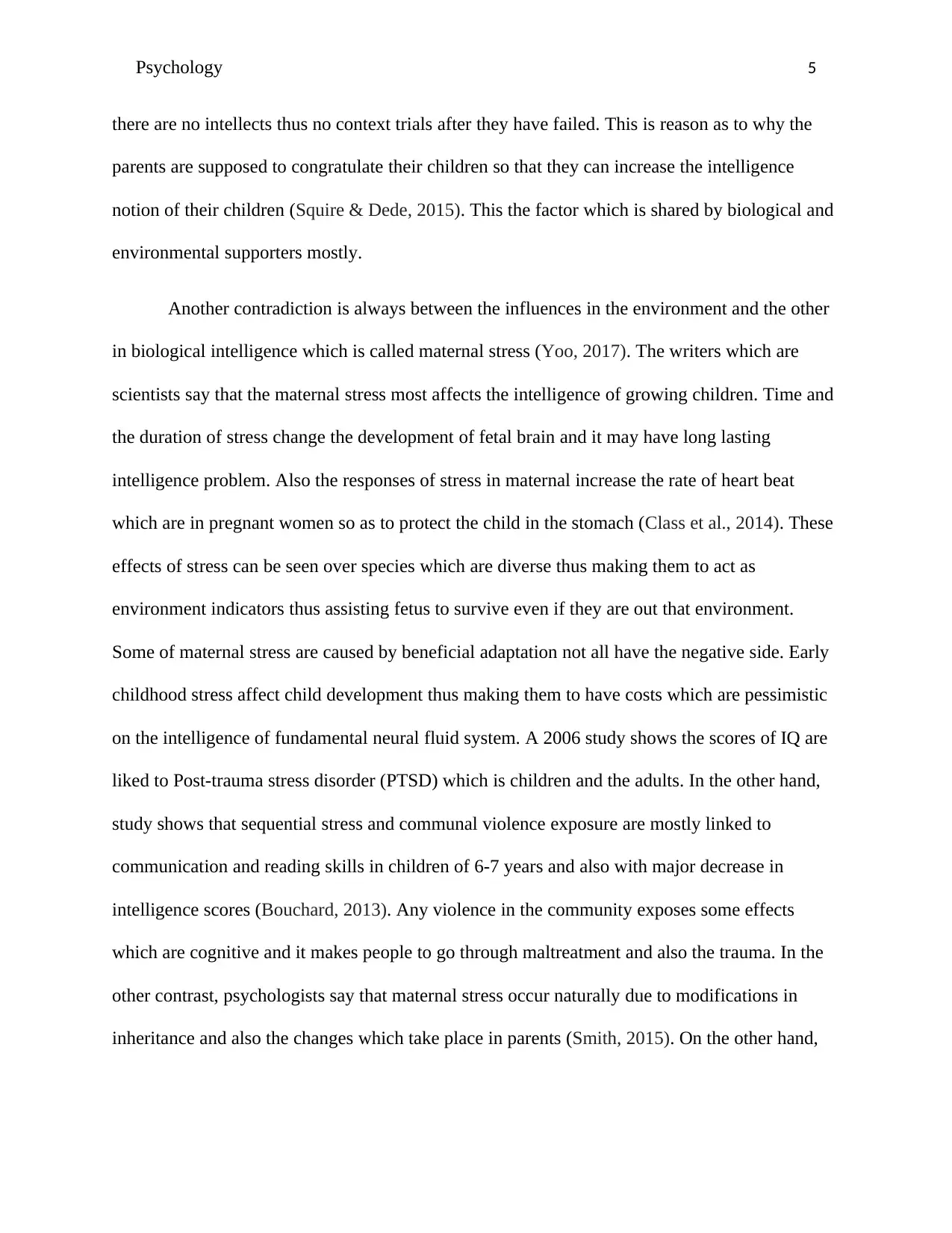
Psychology 5
there are no intellects thus no context trials after they have failed. This is reason as to why the
parents are supposed to congratulate their children so that they can increase the intelligence
notion of their children (Squire & Dede, 2015). This the factor which is shared by biological and
environmental supporters mostly.
Another contradiction is always between the influences in the environment and the other
in biological intelligence which is called maternal stress (Yoo, 2017). The writers which are
scientists say that the maternal stress most affects the intelligence of growing children. Time and
the duration of stress change the development of fetal brain and it may have long lasting
intelligence problem. Also the responses of stress in maternal increase the rate of heart beat
which are in pregnant women so as to protect the child in the stomach (Class et al., 2014). These
effects of stress can be seen over species which are diverse thus making them to act as
environment indicators thus assisting fetus to survive even if they are out that environment.
Some of maternal stress are caused by beneficial adaptation not all have the negative side. Early
childhood stress affect child development thus making them to have costs which are pessimistic
on the intelligence of fundamental neural fluid system. A 2006 study shows the scores of IQ are
liked to Post-trauma stress disorder (PTSD) which is children and the adults. In the other hand,
study shows that sequential stress and communal violence exposure are mostly linked to
communication and reading skills in children of 6-7 years and also with major decrease in
intelligence scores (Bouchard, 2013). Any violence in the community exposes some effects
which are cognitive and it makes people to go through maltreatment and also the trauma. In the
other contrast, psychologists say that maternal stress occur naturally due to modifications in
inheritance and also the changes which take place in parents (Smith, 2015). On the other hand,
there are no intellects thus no context trials after they have failed. This is reason as to why the
parents are supposed to congratulate their children so that they can increase the intelligence
notion of their children (Squire & Dede, 2015). This the factor which is shared by biological and
environmental supporters mostly.
Another contradiction is always between the influences in the environment and the other
in biological intelligence which is called maternal stress (Yoo, 2017). The writers which are
scientists say that the maternal stress most affects the intelligence of growing children. Time and
the duration of stress change the development of fetal brain and it may have long lasting
intelligence problem. Also the responses of stress in maternal increase the rate of heart beat
which are in pregnant women so as to protect the child in the stomach (Class et al., 2014). These
effects of stress can be seen over species which are diverse thus making them to act as
environment indicators thus assisting fetus to survive even if they are out that environment.
Some of maternal stress are caused by beneficial adaptation not all have the negative side. Early
childhood stress affect child development thus making them to have costs which are pessimistic
on the intelligence of fundamental neural fluid system. A 2006 study shows the scores of IQ are
liked to Post-trauma stress disorder (PTSD) which is children and the adults. In the other hand,
study shows that sequential stress and communal violence exposure are mostly linked to
communication and reading skills in children of 6-7 years and also with major decrease in
intelligence scores (Bouchard, 2013). Any violence in the community exposes some effects
which are cognitive and it makes people to go through maltreatment and also the trauma. In the
other contrast, psychologists say that maternal stress occur naturally due to modifications in
inheritance and also the changes which take place in parents (Smith, 2015). On the other hand,
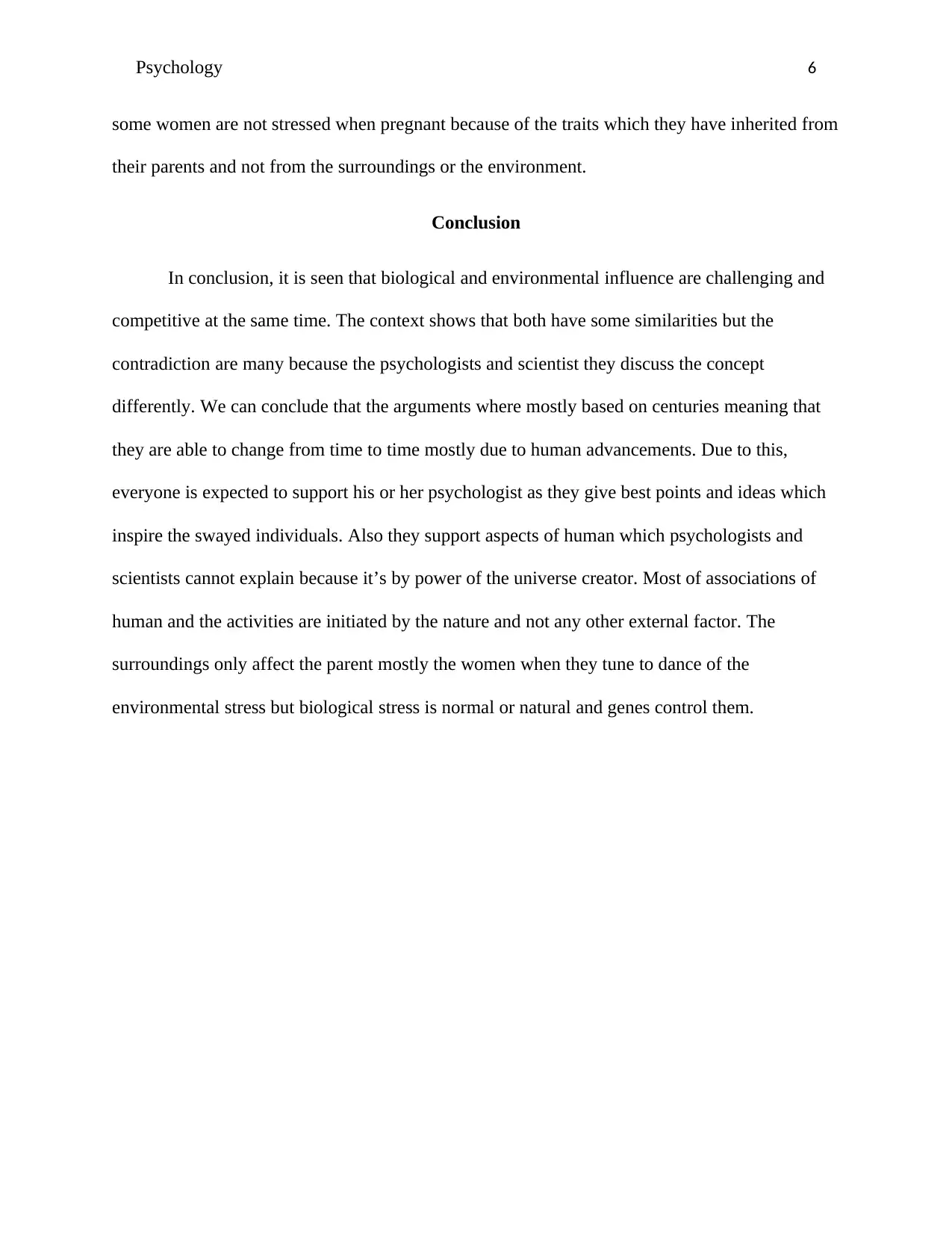
Psychology 6
some women are not stressed when pregnant because of the traits which they have inherited from
their parents and not from the surroundings or the environment.
Conclusion
In conclusion, it is seen that biological and environmental influence are challenging and
competitive at the same time. The context shows that both have some similarities but the
contradiction are many because the psychologists and scientist they discuss the concept
differently. We can conclude that the arguments where mostly based on centuries meaning that
they are able to change from time to time mostly due to human advancements. Due to this,
everyone is expected to support his or her psychologist as they give best points and ideas which
inspire the swayed individuals. Also they support aspects of human which psychologists and
scientists cannot explain because it’s by power of the universe creator. Most of associations of
human and the activities are initiated by the nature and not any other external factor. The
surroundings only affect the parent mostly the women when they tune to dance of the
environmental stress but biological stress is normal or natural and genes control them.
some women are not stressed when pregnant because of the traits which they have inherited from
their parents and not from the surroundings or the environment.
Conclusion
In conclusion, it is seen that biological and environmental influence are challenging and
competitive at the same time. The context shows that both have some similarities but the
contradiction are many because the psychologists and scientist they discuss the concept
differently. We can conclude that the arguments where mostly based on centuries meaning that
they are able to change from time to time mostly due to human advancements. Due to this,
everyone is expected to support his or her psychologist as they give best points and ideas which
inspire the swayed individuals. Also they support aspects of human which psychologists and
scientists cannot explain because it’s by power of the universe creator. Most of associations of
human and the activities are initiated by the nature and not any other external factor. The
surroundings only affect the parent mostly the women when they tune to dance of the
environmental stress but biological stress is normal or natural and genes control them.
⊘ This is a preview!⊘
Do you want full access?
Subscribe today to unlock all pages.

Trusted by 1+ million students worldwide
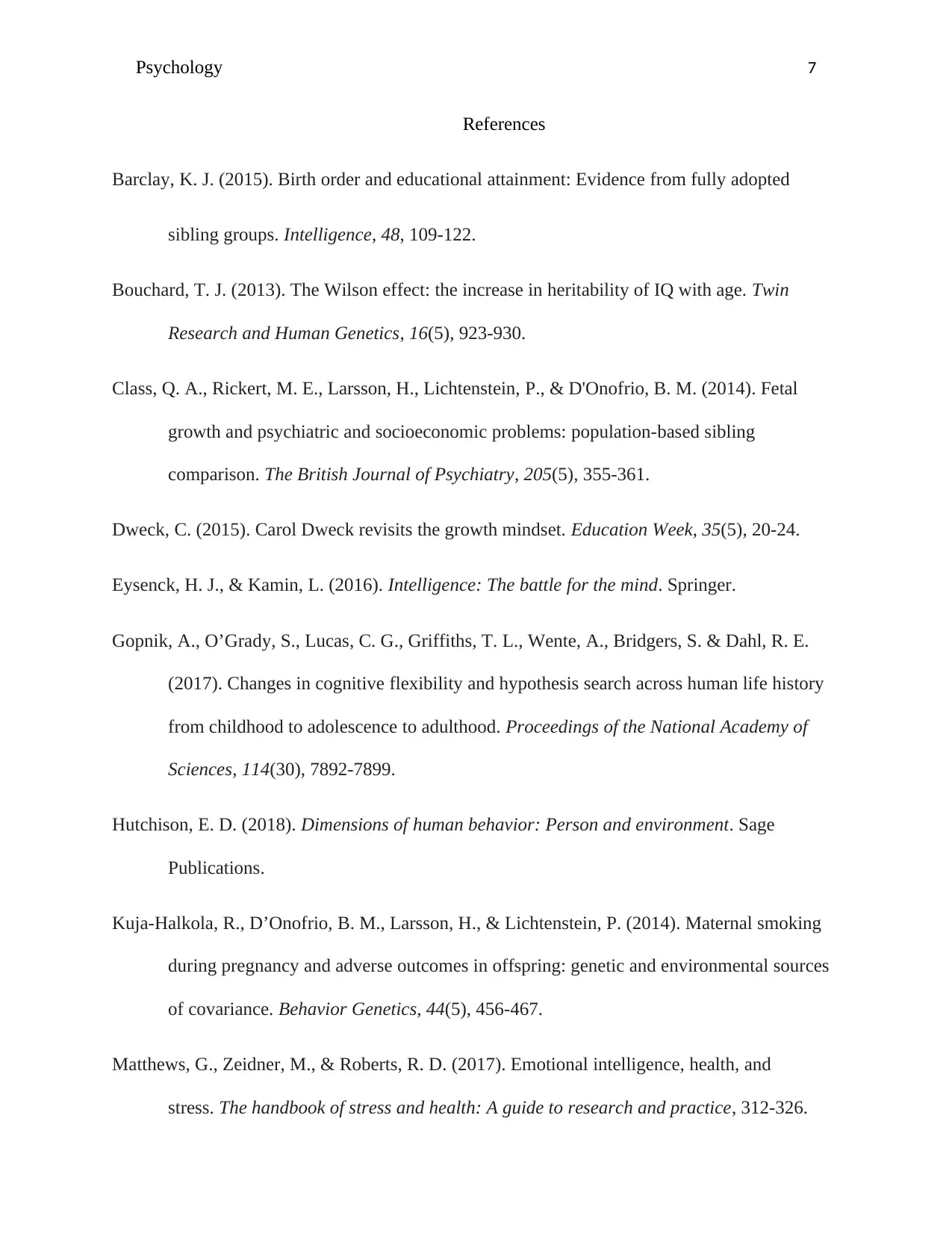
Psychology 7
References
Barclay, K. J. (2015). Birth order and educational attainment: Evidence from fully adopted
sibling groups. Intelligence, 48, 109-122.
Bouchard, T. J. (2013). The Wilson effect: the increase in heritability of IQ with age. Twin
Research and Human Genetics, 16(5), 923-930.
Class, Q. A., Rickert, M. E., Larsson, H., Lichtenstein, P., & D'Onofrio, B. M. (2014). Fetal
growth and psychiatric and socioeconomic problems: population-based sibling
comparison. The British Journal of Psychiatry, 205(5), 355-361.
Dweck, C. (2015). Carol Dweck revisits the growth mindset. Education Week, 35(5), 20-24.
Eysenck, H. J., & Kamin, L. (2016). Intelligence: The battle for the mind. Springer.
Gopnik, A., O’Grady, S., Lucas, C. G., Griffiths, T. L., Wente, A., Bridgers, S. & Dahl, R. E.
(2017). Changes in cognitive flexibility and hypothesis search across human life history
from childhood to adolescence to adulthood. Proceedings of the National Academy of
Sciences, 114(30), 7892-7899.
Hutchison, E. D. (2018). Dimensions of human behavior: Person and environment. Sage
Publications.
Kuja-Halkola, R., D’Onofrio, B. M., Larsson, H., & Lichtenstein, P. (2014). Maternal smoking
during pregnancy and adverse outcomes in offspring: genetic and environmental sources
of covariance. Behavior Genetics, 44(5), 456-467.
Matthews, G., Zeidner, M., & Roberts, R. D. (2017). Emotional intelligence, health, and
stress. The handbook of stress and health: A guide to research and practice, 312-326.
References
Barclay, K. J. (2015). Birth order and educational attainment: Evidence from fully adopted
sibling groups. Intelligence, 48, 109-122.
Bouchard, T. J. (2013). The Wilson effect: the increase in heritability of IQ with age. Twin
Research and Human Genetics, 16(5), 923-930.
Class, Q. A., Rickert, M. E., Larsson, H., Lichtenstein, P., & D'Onofrio, B. M. (2014). Fetal
growth and psychiatric and socioeconomic problems: population-based sibling
comparison. The British Journal of Psychiatry, 205(5), 355-361.
Dweck, C. (2015). Carol Dweck revisits the growth mindset. Education Week, 35(5), 20-24.
Eysenck, H. J., & Kamin, L. (2016). Intelligence: The battle for the mind. Springer.
Gopnik, A., O’Grady, S., Lucas, C. G., Griffiths, T. L., Wente, A., Bridgers, S. & Dahl, R. E.
(2017). Changes in cognitive flexibility and hypothesis search across human life history
from childhood to adolescence to adulthood. Proceedings of the National Academy of
Sciences, 114(30), 7892-7899.
Hutchison, E. D. (2018). Dimensions of human behavior: Person and environment. Sage
Publications.
Kuja-Halkola, R., D’Onofrio, B. M., Larsson, H., & Lichtenstein, P. (2014). Maternal smoking
during pregnancy and adverse outcomes in offspring: genetic and environmental sources
of covariance. Behavior Genetics, 44(5), 456-467.
Matthews, G., Zeidner, M., & Roberts, R. D. (2017). Emotional intelligence, health, and
stress. The handbook of stress and health: A guide to research and practice, 312-326.
Paraphrase This Document
Need a fresh take? Get an instant paraphrase of this document with our AI Paraphraser
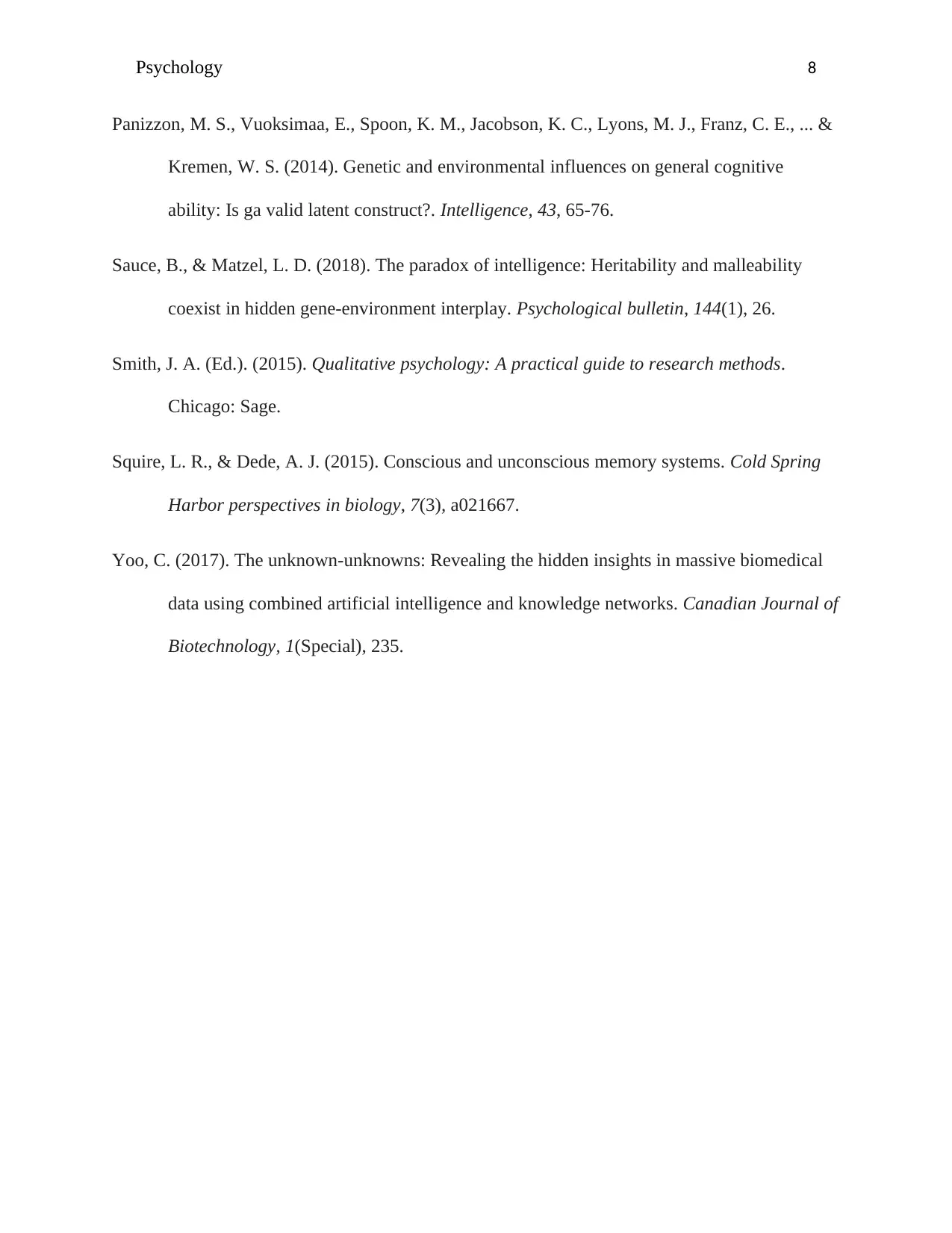
Psychology 8
Panizzon, M. S., Vuoksimaa, E., Spoon, K. M., Jacobson, K. C., Lyons, M. J., Franz, C. E., ... &
Kremen, W. S. (2014). Genetic and environmental influences on general cognitive
ability: Is ga valid latent construct?. Intelligence, 43, 65-76.
Sauce, B., & Matzel, L. D. (2018). The paradox of intelligence: Heritability and malleability
coexist in hidden gene-environment interplay. Psychological bulletin, 144(1), 26.
Smith, J. A. (Ed.). (2015). Qualitative psychology: A practical guide to research methods.
Chicago: Sage.
Squire, L. R., & Dede, A. J. (2015). Conscious and unconscious memory systems. Cold Spring
Harbor perspectives in biology, 7(3), a021667.
Yoo, C. (2017). The unknown-unknowns: Revealing the hidden insights in massive biomedical
data using combined artificial intelligence and knowledge networks. Canadian Journal of
Biotechnology, 1(Special), 235.
Panizzon, M. S., Vuoksimaa, E., Spoon, K. M., Jacobson, K. C., Lyons, M. J., Franz, C. E., ... &
Kremen, W. S. (2014). Genetic and environmental influences on general cognitive
ability: Is ga valid latent construct?. Intelligence, 43, 65-76.
Sauce, B., & Matzel, L. D. (2018). The paradox of intelligence: Heritability and malleability
coexist in hidden gene-environment interplay. Psychological bulletin, 144(1), 26.
Smith, J. A. (Ed.). (2015). Qualitative psychology: A practical guide to research methods.
Chicago: Sage.
Squire, L. R., & Dede, A. J. (2015). Conscious and unconscious memory systems. Cold Spring
Harbor perspectives in biology, 7(3), a021667.
Yoo, C. (2017). The unknown-unknowns: Revealing the hidden insights in massive biomedical
data using combined artificial intelligence and knowledge networks. Canadian Journal of
Biotechnology, 1(Special), 235.
1 out of 8
Related Documents
Your All-in-One AI-Powered Toolkit for Academic Success.
+13062052269
info@desklib.com
Available 24*7 on WhatsApp / Email
![[object Object]](/_next/static/media/star-bottom.7253800d.svg)
Unlock your academic potential
Copyright © 2020–2026 A2Z Services. All Rights Reserved. Developed and managed by ZUCOL.





